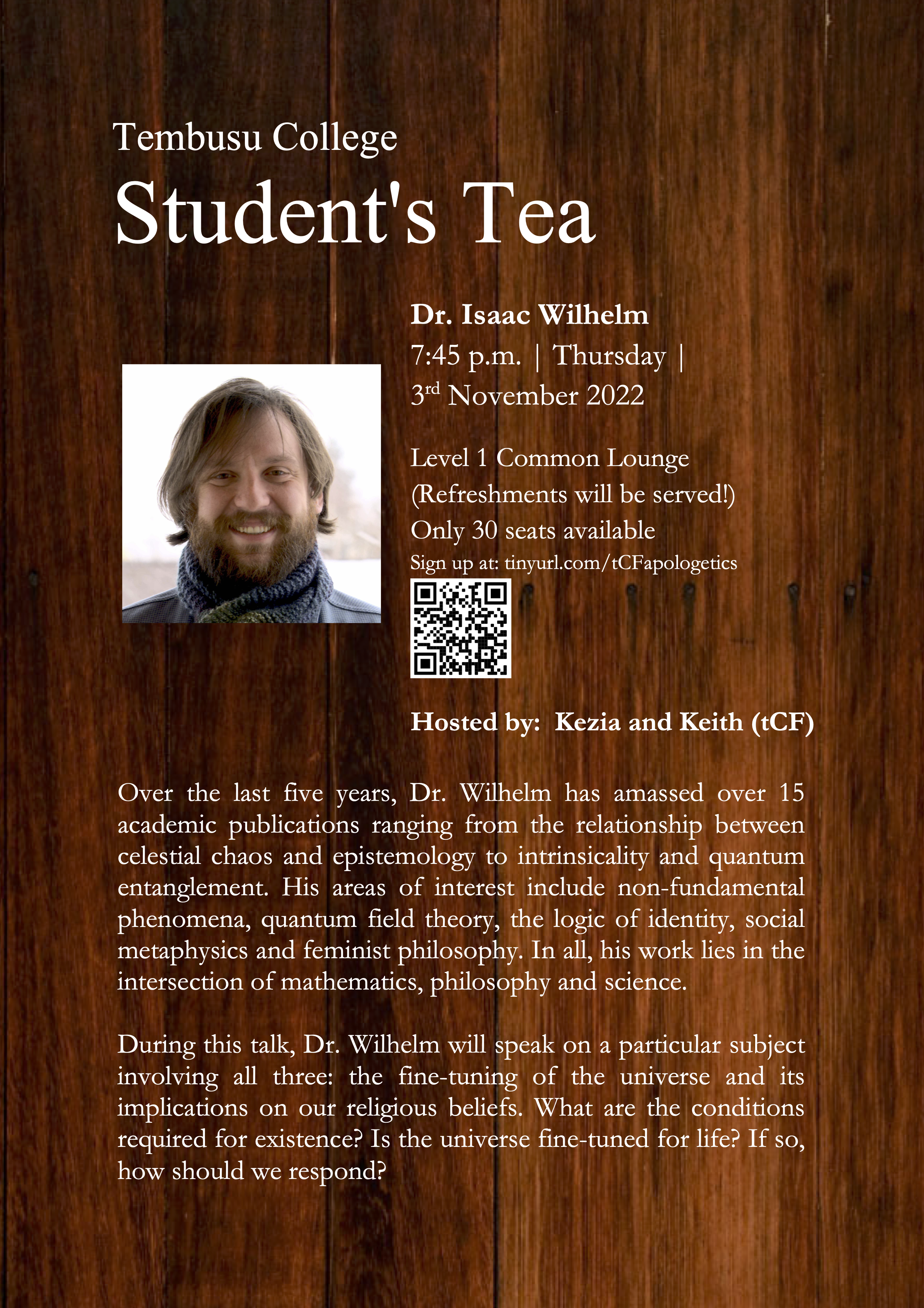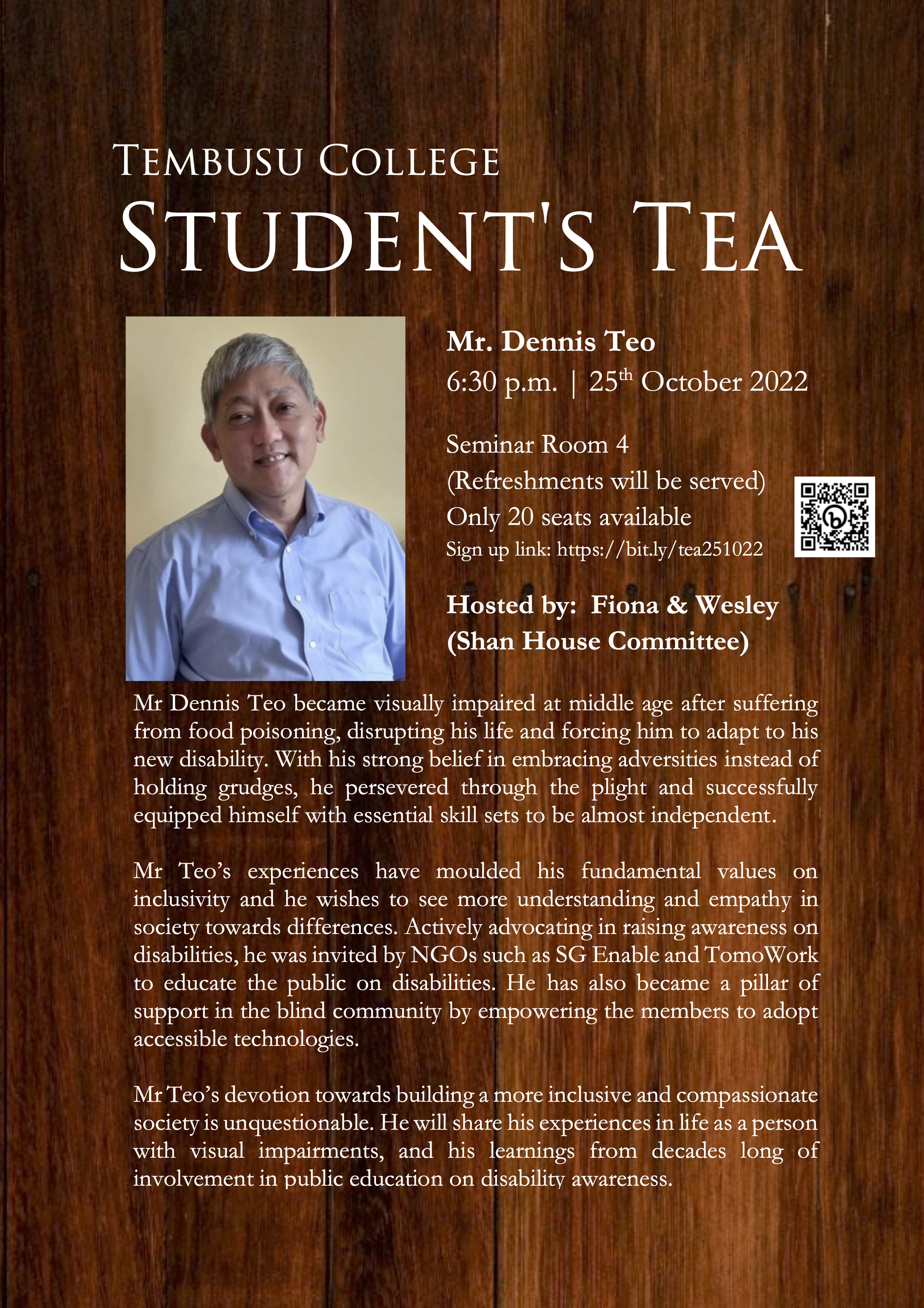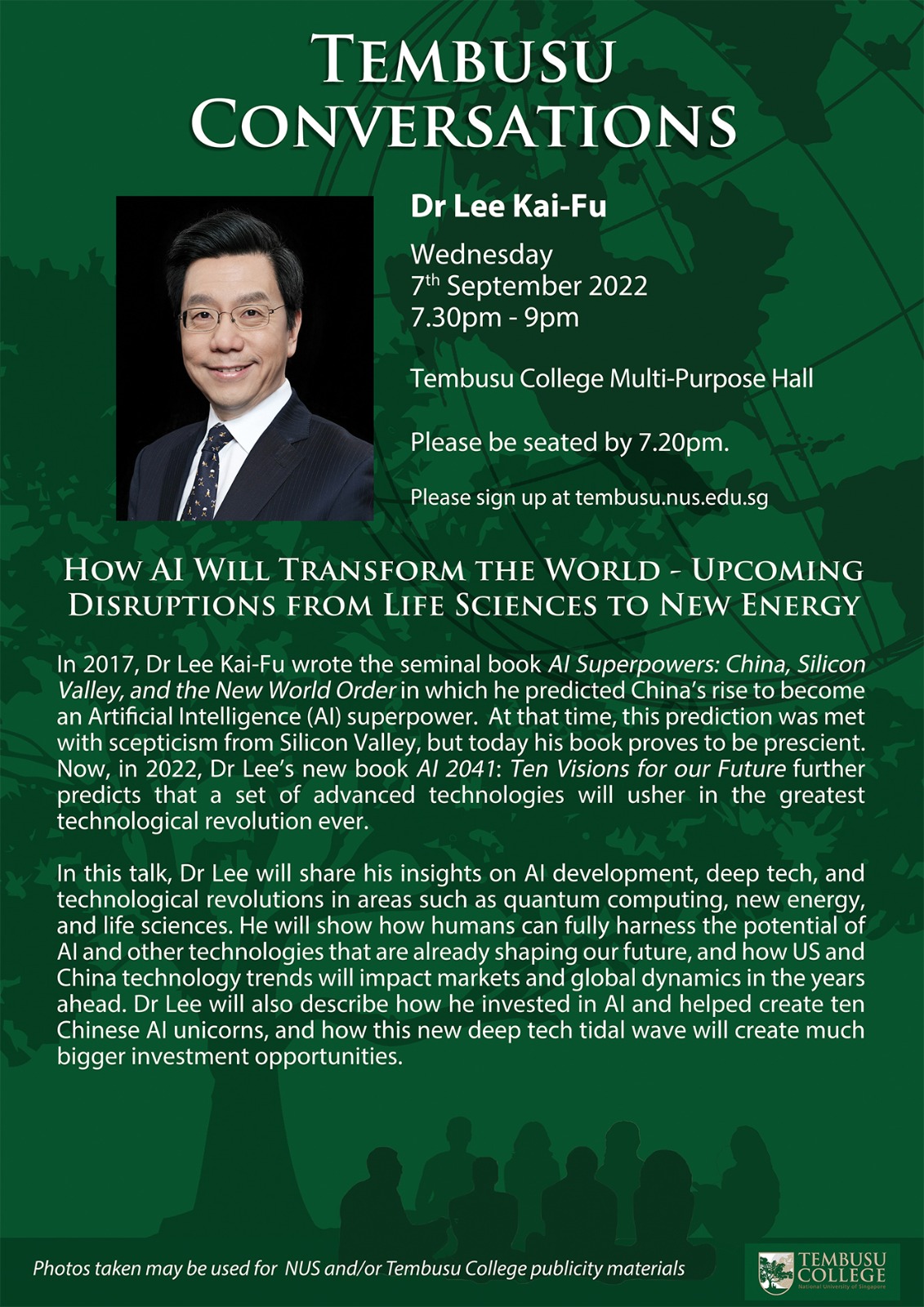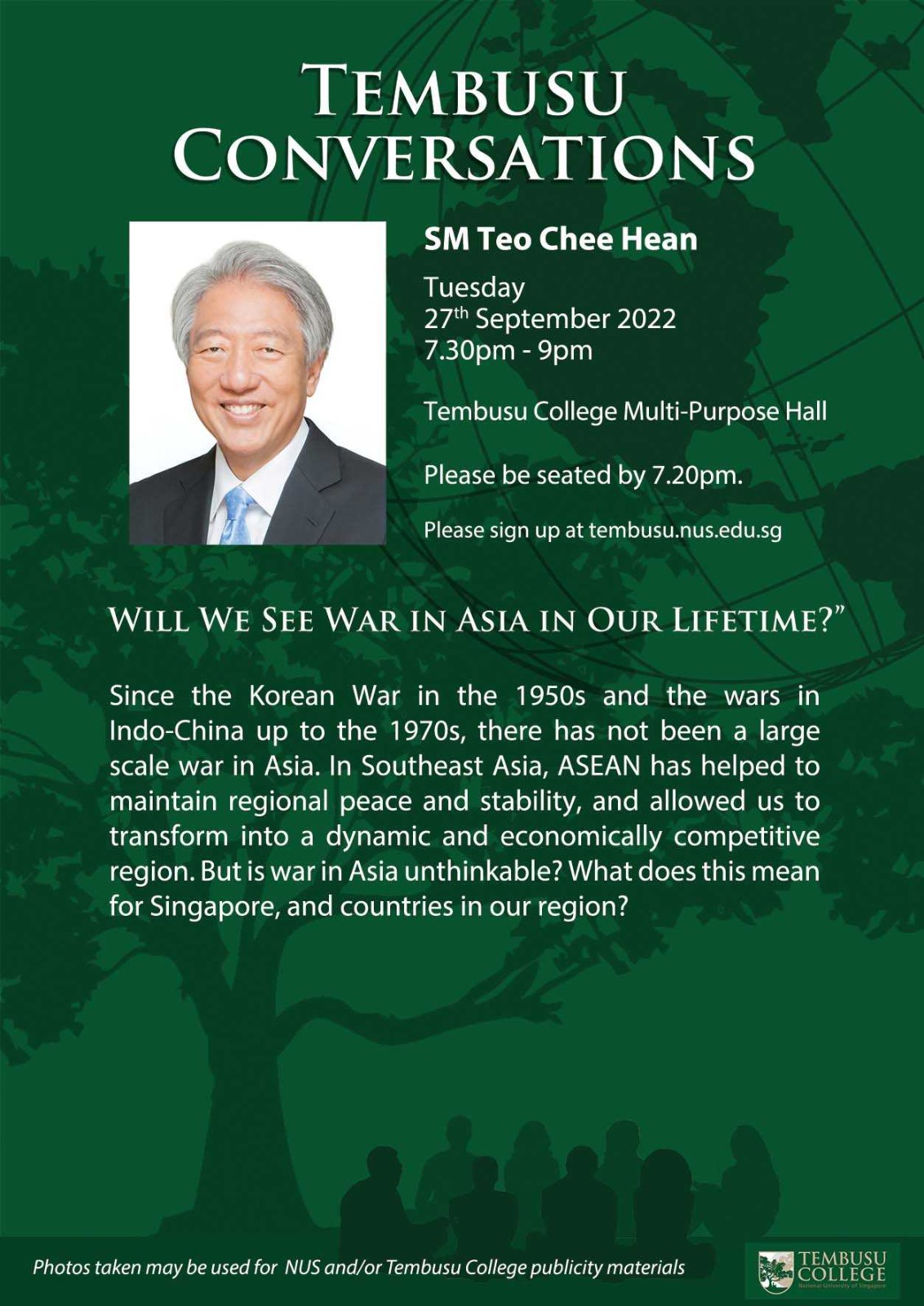Tag: 2022
Tembusu Conversations: Dr Lee Kai-Fu
Click to enlarge
PROGRAMME:
| 7.00pm: | Registration desk opens |
| 7.20pm: | Audience to be seated at Tembusu College's Multi-Purpose Hall |
| 7.30pm: | Start of Tembusu Conversations |
| • 5 minutes introduction by Associate Professor Ho Chee Kong, Master of Tembusu College | |
| • 30 minutes keynote address by speaker | |
| • 45 minutes Question & Answer session with students | |
| • 45 minutes Question & Answer session with students | |
| 9.00pm: | End of dialogue and group photo-taking session |
This session will be held under Chatham House Rule.
STUDENT MODERATOR:
Ms Ayushi Lahiry
BRIEF BIOGRAPHY OF SPEAKER:
Dr Lee Kai-Fu is the Chairman and CEO of Sinovation Ventures and President of Sinovation Venture’s Artificial Intelligence Institute. Sinovation Ventures, managing US$3 billion dual currency investment funds, is a leading venture capital firm focusing on developing the next generation of deep tech companies in China. Prior to founding Sinovation in 2009, Dr Lee was the President of Google China, and Senior Executive at Microsoft, SGI, and Apple.
In the field of Artificial Intelligence (AI), Dr Lee built one of the first game-playing programmes to defeat a world champion (1988, Othello), as well as the world’s first large-vocabulary, speaker-independent continuous speech recognition system. Dr Lee founded Microsoft Research China, later renamed Microsoft Research Asia, that was given the title of the hottest research lab by MIT Technology Review. While with Apple, Dr Lee led AI projects in speech and natural language, which were featured in Good Morning America on ABC Television, and the front page of the Wall Street Journal. He has authored 10 US patents, and more than 100 journal and conference papers. Dr Lee is a Fellow of the Institute of Electrical and Electronics Engineers (IEEE), and was the Co-Chair of Artificial Intelligence Council for the World Economic Forum Centre for the Fourth Industrial Revolution. He was listed in Times 100 in 2013, and WIRED 25 Icons, and has a following of over 50 million audience on social media.
Altogether, Dr Lee has been in AI research, development, and investment for more than 30 years. His New York Times and Wall Street Journal bestselling book AI Superpowers: China, Silicon Valley, and the New World Order discusses US-China co-leadership in the age of AI, as well as the greater societal impacts brought upon by the AI technological revolution. His new co-authored book AI 2041: Ten Visions for Our Future, published in fall 2021, explores how AI will change our world over the next twenty years.
Dr Lee received his Bachelor’s Degree in Computer Science from Columbia University, his PhD from Carnegie Mellon University, and was awarded honorary doctorate degrees from both Carnegie Mellon University and the City University of Hong Kong.
DRESS CODE:
Smart Casual
Gallery
Tembusu Conversations: SM Teo Chee Hean
Click to enlarge
PROGRAMME:
| 7.00pm: | Registration desk opens |
| 7.20pm: | Audience to be seated at Tembusu College's Multi-Purpose Hall |
| 7.30pm: | Start of Tembusu Conversations |
| • 5 minutes introduction by Associate Professor Ho Chee Kong, Master of Tembusu College | |
| • 30 minutes keynote address by speaker | |
| • 45 minutes Question & Answer session with students | |
| • 45 minutes Question & Answer session with students | |
| 9.00pm: | End of dialogue and group photo-taking session |
This session will be held under Chatham House Rule.
STUDENT MODERATOR:
Mr Sven Tan
BRIEF BIOGRAPHY OF SPEAKER:
Mr Teo Chee Hean was appointed Senior Minister on 1 May 2019 and serves, since 21 May 2011, as Coordinating Minister for National Security. He also oversees the Smart Nation and Digital Government Group, the National Security Coordination Secretariat, the National Population and Talent Division and the National Climate Change Secretariat under the Prime Minister’s Office.
In the first phase of his career, he served in the Singapore Armed Forces (SAF) where he held various command and staff appointments in the Republic of Singapore Navy and the Joint Staff. In 1991, he was appointed Chief of Navy, and was promoted to the rank of Rear Admiral. In December 1992, he left the SAF to seek elected public office and was elected as a Member of Parliament in a by-election in the Marine Parade Group Representation Constituency (GRC). He was re-elected to Parliament six times in the Pasir Ris-Punggol GRC.
SM Teo was appointed Deputy Prime Minister from 1 April 2009 to 30 April 2019. He has served as the Minister for Home Affairs, Minister for Defence, Minister for Education, and Minister for the Environment, as well as Minister of State in the Ministries of Finance, Communications and Defence.
He was awarded the President’s Scholarship and the Singapore Armed Forces Scholarship in 1973, and graduated with a Bachelor of Science (First Class Honours) in Electrical Engineering and Management Science from the University of Manchester in 1976. He subsequently attained a Master of Science degree (with distinction) in Computing Science in 1977 at the Imperial College in London, and a Master in Public Administration at the Kennedy School of Government in Harvard University in 1986, where he was named a Littauer Fellow.
DRESS CODE:
Smart Casual
Gallery
By Professor Tommy Koh: The Earth Summit at 30: A Stocktake
The world owes Sweden a big debt of gratitude. It was the first country to convince the United Nations of the importance of the environment. In 1972, the UN held its first conference on the environment in Stockholm. The Anti-Pollution Unit in the Prime Minister’s office in Singapore was upgraded to a new Ministry of the Environment because of the conference in Stockholm.
In 1990, the UN decided to convene a second conference on the environment in 1992, 20 years after Stockholm. Rio de Janeiro, in Brazil, would be the venue for the conference. Unlike Stockholm, the second conference, popularly known as the Earth Summit, would have a double focus: environment and development.
The UN established a committee to prepare for the Earth Summit. My then boss at the Ministry of Foreign Affairs, Kishore Mahbubani, and our then Ambassador to the UN, Chan Heng Chee, persuaded me to put my name forward as a candidate to chair the preparatory committee. I was duly elected as no one else wanted to suffer for the next two years.
At the summit, in June 1992, the host country, Brazil, decided not to nominate one of its citizens to chair the main committee of the conference. Instead, Brazil requested me to do so. All the negotiations at the summit took place in that committee. The summit began on June 3 and concluded on June 14, 1992.
I will never forget the last day of the Main Committee’s work. The final meeting began at 8pm and ended at 6am the next day. I was in the chair for 10 hours, with only 1 toilet break! Miraculously, we managed to achieve consensus on all the matters before the committee.
Earth Summit’s Achievements
The Earth Summit was very successful. Two landmark environmental treaties were opened for signature in Rio – the UN Framework Convention on Climate Change (UNFCCC) and the UN Convention on Biological Diversity (CBD). The summit adopted the Rio Declaration of Principles on Environment and Development. The summit also gave birth to two new treaties: one to combat desertification and the other was related to highly migratory fish stocks and straddling fish stocks.
Thirty years have passed since the Earth Summit. It is a good time to evaluate the results of the summit. Where have we succeeded? What are the failures? What lessons can we learn from the past 30 years?
Until 1992, there was a war between the developing countries which gave priority to development and the developed countries which gave priority to the environment. In Rio, we agreed to give equal emphasis to the environment and development. We borrowed the concept of sustainable development from the 1987 Brundtland Commission’s report. Since then, the term, “sustainability” has been universally accepted.
There is also now a body of international law called international environmental law. At the final session of the Preparatory Committee, I chaired the negotiations on the Rio Declaration and drafted the declaration which contains 27 principles. Some of these principles have been universally accepted and have acquired the status of law. These principles include the precautionary principle, the polluter pay principle, the requirement to conduct an environmental impact assessment, and the obligation to inform and consult your neighbouring state of any plan which could adversely affect its environment. The NUS Law School has a very good centre on environmental law.
CBD and UNFCCC – Success or failure?
In the natural world, all things are connected. For example, our agricultural industry and our horticultural industry depend on the honey bee, as a pollinator. The decline in the population of the honey bee is therefore of concern. The purpose of the CBD is to stop or at least, to slow down the extinction of the species.
Has the CBD been successful? The frank answer is that it has been a failure. We are losing species of flora and fauna at an unprecedented rate. Things are so bad that some scientists are calling this the Sixth Mass Extinction.
The good news is that Singapore has been swimming against the tide.
We took the lead to galvanise the support of cities to conserve biological diversity. In recognition of our leadership role, the UN has named the City Biodiversity Index, the Singapore Index on Cities’ Biodiversity. Our message to the world is that cities can co-exist with nature.
Singapore has also made an important transition from a city in a garden to a city in nature. The hunting of birds and animals is strictly forbidden. Animals such as the hornbill bird, otters, wild boar and jungle fowl, which had disappeared, have returned and are flourishing.
The UNFCC is the mother treaty on climate change. It has 197 parties. The parties meet annually. The annual meeting is called the Conference of Parties or COP, in short. The meeting in Glasgow in 2021 was COP 26. COP 27 will be held in Sharm El-Sheikh, in Egypt, in November.
The reports of the Intergovernmental Panel on Climate Change or IPCC, have established beyond any reasonable doubt that the climate is changing, and the change has been caused by man’s activities. The challenge is to bring down our total emission of carbon dioxide and other greenhouse gases before it becomes impossible to limit the rise in temperature to 1.5 deg C.
At COP 21 in Paris in 2015, the French succeeded in producing an agreement against all odds. The agreement does not exempt the developing countries. All countries are called upon to make a sacrifice for the common good. Every country is asked to make a nationally determined contribution. However, according to the UNFCCC Secretariat, the current nationally determined contributions would exceed the goal of 1.5 deg C and be close to 3 deg C.
Not too late
Experts do not agree on whether the goal of 1.5 deg C is still achievable. The pessimists believe that the battle is lost. The optimists believe that it is still achievable if all of us raise our ambitions, to decarbonise our economy, our industry, our business, our transport system, our power industry, our shipping and aviation industries and the way we live.
The Singapore government is taking climate change very seriously. It sees climate change as a challenge but also as an opportunity. Sustainability and the green economy will create many new businesses and jobs.
The Singapore government has produced an ambitious Green Plan. It has also pledged to achieve net zero by or around 2050.
My own view is that the battle to limit the rise of temperature to 1.5 deg C has not been lost. If the world responds to the commitments made at COP 26 in Glasgow and takes more ambitious steps to transition to a low carbon economy and lifestyle, the battle can still be won. The window is, however, closing rapidly.
The conclusion of this stocktake is a mixed one. The ideological battle between the developed and developing countries has been resolved. The magic word is sustainability. On biodiversity, we are faced with a possible Sixth Mass Extinction. On climate change, the battle to limit the rise of global temperature to below 1.5 deg C has not been lost but the window is rapidly closing. I urge all Singaporeans to support the government’s Green Plan.
Tembusu College bids farewell to our ‘rockstar’ rector Prof Tommy Koh
In a tribute to Professor Tommy Koh’s many contributions to Tembusu College and NUS Law Faculty, the Straits Times published an article about our beloved Rector.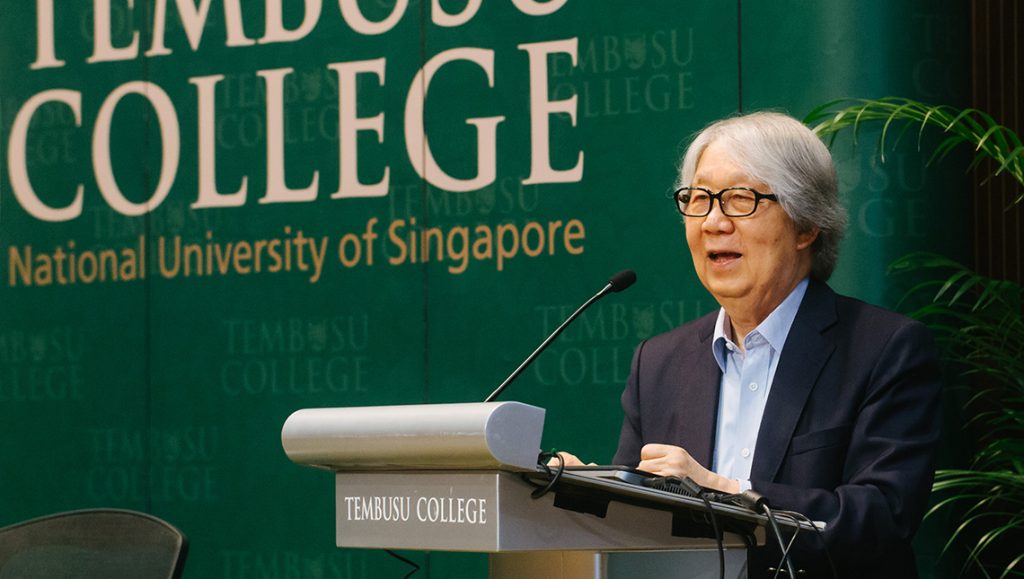
Here is the full text of the article.
Kay Yeo Hui Qin won Bert Peeters Prize for Best Student Project in NSM Semantics
The college would like to send its heartiest congratulations to Year 2 student Kay Yeo who won the inaugural Bert Peeters Prize 2022 for her essay “Understanding an atas Singaporean”. What started out as an assignment for the IEM2 module ‘What’s in a word?’ Meaning across cultures, it developed into a 4000-word paper submission with the support of Kay’s IEM tutor, Dr Wong Jock Onn. It nailed the Prize for Best Student Project in NSM Semantics annual writing competition (https://nsm-approach.net/bert-peeters-prize) earlier this year. The prize was named after Bert Peeters who was an NSM (natural semantic metalanguage) semanticist and he passed away in 2021.
Kay drew inspiration from her interactions with her friends where she learnt about the word ‘atas’. According to Kay, what piqued her interest in the term was that it is culturally significant because when someone calls another ‘atas’, it could be to draw distance or to confirm one’s desire to be like the other. She tried to capture such conflicting ideas reflected in the use of the term in her winning submission.
The judges’ comments were:
“Your essay on “Understanding an atas Singaporean” is truly excellent. It is extremely clear and well-reasoned, draws on a good range of naturally occurring examples, and provides the necessary cultural contextualisation. I look forward to meeting you online at NSM-Con2022 and hearing your presentation. You clearly have great potential as an NSM researcher. I dearly hope you will advance to higher studies.” –Cliff Goddard, Professor in Linguistics, Griffith University
“An excellent choice of a word to nominate and explore as a Singaporean key word. Culturally very illuminating topic. Very well-chosen examples of use presented as evidence for the proposed analysis. Excellent use of data sources, a very useful survey. At the same time, the limitations of this data collection are properly acknowledged in the Conclusion.” –Anna Wierzbicka, Professor of Linguistics (Emerita), The Australian National University
Kay presented her paper at a recent NSM conference. Here is a link to the YouTube video recording of Kay’s presentation: https://youtu.be/piP5xm3gfbI
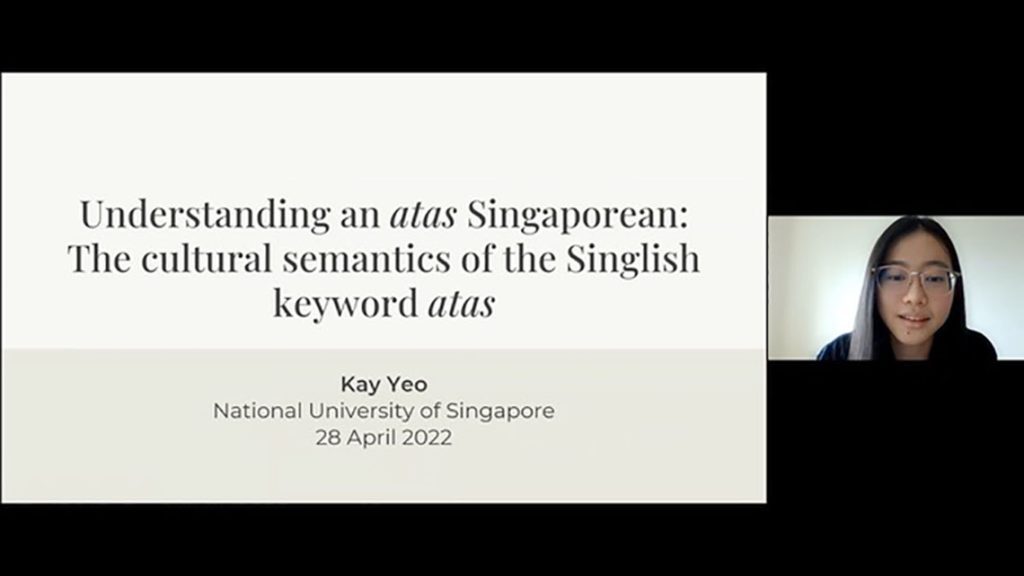
By Professor Tommy Koh: UNCLOS is 40 today. Should we celebrate?
On April 30, 1982, the United Nations Convention on the Law of the Sea (UNCLOS) was adopted after nine years of negotiations. There are currently 168 parties to the convention, which came into force in 1994.
Today, on the 40th anniversary of its adoption, is UNCLOS still relevant?
ln this essay, I want to put forward the view that the convention is still relevant and fit for purpose. I believe that we should celebrate the anniversary for the following reasons.
1. It replaced chaos with order
UNCLOS had put an end to a period of chaos and unilateralism in the law of the sea. The first country to make an unilateral claim was the United States. In 1945, President Harry Truman issued a proclamation claiming jurisdiction and control of the natural resources of the country’s continental shelf. The US action was followed by an avalanche of claims by Chile, Peru, Brazil, El Salvador, Panama and Uruguay. These Latin-America countries claimed some form of jurisdiction, extending to 200 miles from their coasts.
Separately, Iceland claimed a fishery zone of 50 miles. Indonesia and the Philippines made claims based on the concept of archipelagic states. By 1976, a majority of the countries of the world claimed a territorial sea of 12 miles, as opposed to the traditional limit of 3 miles.
UNCLOS had put a stop to these unilateral claims. This is why I have called the convention, the “constitution for the world’s oceans”. All countries, including those who are not parties to UNCLOS, accept the convention as the foundation of the legal order governing the uses and resources of the oceans.
2. It’s the mother of 3 successful institutions
UNCLOS has given birth to three successful institutions. The first is the International Tribunal For The Law Of The Sea (ITLOS), based Hamburg, Germany. ITLOS is a specialised international court, focusing on disputes between states, on the interpretation and application of the convention.
ITLOS has proven to be a useful addition to the International Court of Justice. The fear by some that the tribunal and the court may develop conflicting jurisprudences on the law of the sea, has proven to be unfounded.
The second institution is the International Seabed Authority (ISA), based in Kingston, Jamaica. The ISA has jurisdiction over the resources of the deep seabed and ocean floor, beyond the limits of national jurisdiction. It plays an important role in regulating mineral-related activities in the international seabed area.
For instance, ISA has a deep seabed exploration contract with Ocean Mineral Singapore for a mine site located between Hawaii and Mexico. The site contains deposits of polymetallic nodules bearing important minerals such as copper, nickel, cobalt and manganese, as well as rare earths.
The third institution is the Commission on the Limits of the Continental Shelf. This is a technical body which examines claims by coastal states to continental shelves beyond 200 miles.
3. It protects the marine environment
UNCLOS is one of the most robust environmental treaties. The convention imposes a clear obligation on all states to protect and preserve the marine environment.
The convention treats the oceans as an ecological unity. It seeks to protect the oceans and marine environment from all sources of pollution.
I welcome the recent decision by the UN Environment Assembly to begin negotiations for a new treaty on marine plastic pollution.
4. It keeps the peace at sea
UNCLOS has helped to prevent conflicts at sea. Wars can occur when the law is not clear or when there is no law. For example, Iceland claimed an exclusive fishing zone of 50 miles. The UK rejected the claim. The result was a war between them in 1972 and 1973 over fishing rights. There were also many disputes between the United States and the coastal states of Latin-America overfishing rights.
The clear rules in the convention, on the rights and obligations of coastal states and other states, in the different maritime zones, are critical in avoiding conflict. UNCLOS has therefore contributed to peace at sea.
5. It provides for compulsory dispute settlement
One of the unique features of UNCLOS is the system of compulsory dispute settlement. Any country which becomes a party of the convention is bound by the system.
For example, in July 2003, Malaysia initiated arbitral proceedings against Singapore under UNCLOS. Malaysia also applied to ITLOS for provisional measures. Singapore accepted the legal challenge and agreed to participate in the arbitration. Singapore also appeared before ITLOS to rebut Malaysia’s claims and request for provisional measures.
The system enhances the prospects that dispute between states, on the interpretation and application of the convention, will be settled peacefully.
Since the convention came into effect, states have made good use of the modalities provided by the convention, including arbitration, adjudication and compulsory conciliation.
I regret to say that there are a few countries which are parties to the convention, and which do not wish to be bound by the system of compulsory dispute settlement even though it is clear that there is no opt-out clause or escape hatch.
6: It’s a post-colonial and revolutionary treaty
UNCLOS is a post-colonial treaty, with developing countries playing a major role in its making.
It is also not a codification treaty. One the contrary, it is a revolutionary treaty and contains many new concepts of law, such as the exclusive economic zone, straits used for international navigation, transit passage, archipelagic waters, archipelagic sea lane passage and the common heritage of mankind. The view that UNCLOS is a product of the West is without merit.
7. It’s a living document
UNCLOS is 40 years old. Is it still fit for purpose? Is it able to respond to new challenges and developments?
My answer is that UNCLOS is a living document. It is able to respond to new challenges and developments.
Let me cite one example: The convention was faced with the problem of how to regulate two categories of fish: highly migratory species such as tuna, and species like salmon, which lives in more than one jurisdiction during its life cycle. In 1995, the UN was able to adopt a new agreement on Highly Migratory and Straddling Fish Stocks. The agreement was adopted by the UN General Assembly as an Implementation Agreement, under UNCLOS.
There is currently a UN conference, chaired by a Singaporean, Ambassador Rena Lee. The conference is seeking to reach agreement on the conservation and sustainable use of biological diversity, in areas beyond national jurisdiction. If the conference is successful, and I am confident that it will be, the outcome will be embodied in a new Implementation Agreement, under the convention.
8. Climate Change and Sea Level Rise
Climate change and sea level rise will impact many aspects of the law of the sea. Sea level rise poses an existential threat to some countries, especially, the small island developing countries.
The convention contains the legal instruments to address this monumental challenge, but states must act and do so urgently. The Secretary-General, Antonio Guterres, has described the situation as a Code Red for humanity.
A Precious Victory
I hope I have succeeded in persuading the readers that we should celebrate the 40th anniversary of UNCLOS.
The convention – the product of hard-fought negotiations lasting almost a decade is a victory for the United Nations, a victory for international law and the rule of law and a victory for the peaceful settlement of disputes.
This victory is precious, especially in the current difficult circumstances the world faces. I am glad that I was able to play a very small part in this story.
impacT featured Nurturing young leaders in public policy and social impact
Tembusu’s student interest group impacT has been featured in the NUS news. As a student-led organisation, it strives to provide tertiary students with exposure to public policy and social impact. They have invited various prominent personalities working in policy-making, foreign policy and social service agencies to their workshops and podcasts.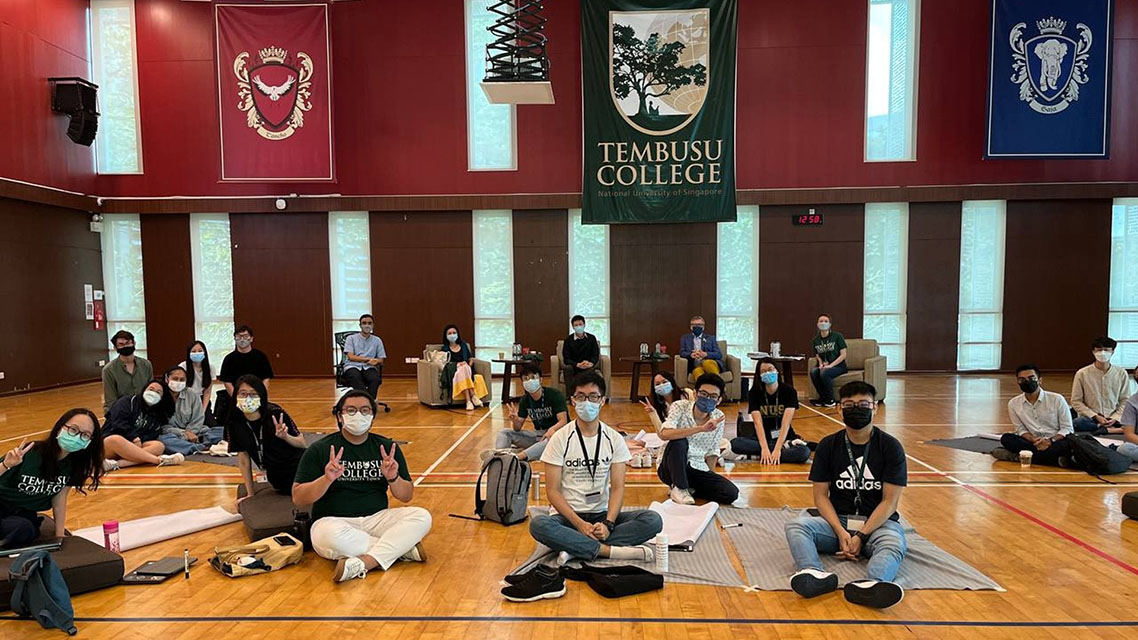
For more details, read on here: https://news.nus.edu.sg/nurturing-young-leaders-in-public-policy-and-social-impact/
Change in Rector of Tembusu College
The College bids farewell to Professor Tommy Koh and is deeply grateful to him for his dedication and invaluable contributions over the last twelve years as Rector of Tembusu College. As the founding Rector, he has contributed much to the College’s programmes, and has encouraged students to embrace diversity and be inspired by people from all walks of life. He has organised and chaired the Tembusu Forum which is the College’s flagship project to discuss issues important to Singapore, the region, and the world. He invited many renowned speakers and dignitaries to the Forum and in doing so took Tembusu College to the world. He will relinquish his role as Rector of Tembusu College on 30 June 2022. We wish him the all the best in his future pursuits.
Mrs Lim Hwee Hua has been appointed Rector of Tembusu College, with effect from 1 July 2022. Hwee Hua was first elected to Parliament in December 1996 and served till May 2011. Her last roles were as Minister in the Prime Minister’s Office, Singapore, and concurrently as Second Minister for Finance and for Transport. Between 2002 and 2004, she was Deputy Speaker of Parliament and Chairman of the Public Accounts Committee.
Prior to joining the Singapore Cabinet, she enjoyed a varied career in financial services. At Temasek Holdings (2000-2004), she served as Managing Director and oversaw divestments, restructured companies, and boards; established strategic relations with key foreign counterparts; and sat on boards including those of PSA, Keppel and Mapletree.
Mrs Lim Hwee Hua is currently engaged in private equity (Tembusu Partners, Kohlberg KravisRoberts), banking (United Overseas Bank, Westpac Bank), and maritime services (BergesenWorldwide Group). She also sits on a number of boards and has been a Distinguished Visiting Fellow at the NUS Business School and the Lee Kuan Yew School of Public Policy. Between 2011 and 2014, she served on the Ernst & Young Global Advisory Council.
Students at Tembusu College will benefit immensely from Hwee Hua’s rich, varied, and interesting career and leadership experiences.


